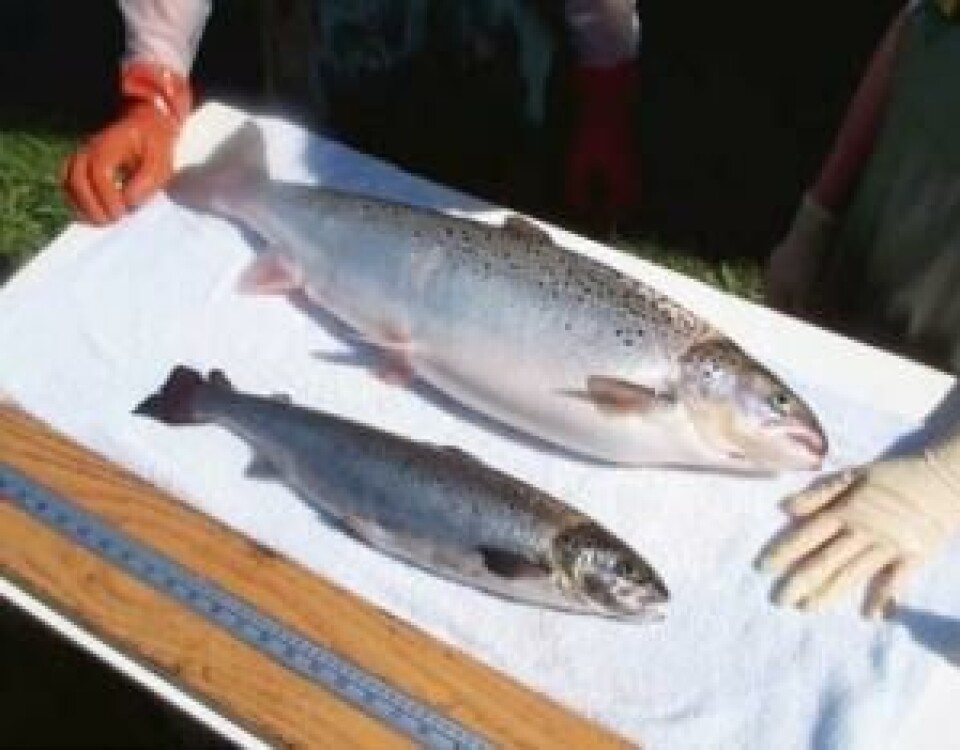
AquaAdvantage salmon: Canada says yes!
Health Canada joins the FDA in concluding that the genetically modified fish produced by AquaBounty poses no environmental concern and is safe to eat.
Today Canada joins the United States in approving the AquAdvantage salmon (AAS) for human consumption.
AquaBounty Technologies, Inc., has just announced that Health Canada (HC) has concluded its review of the AquAdvantage® Salmon (AAS) and just given the green light to sell the fish commercially.
Furthermore, the Animal Feed Division (AFD) of the Animal Health Directorate of the Canadian Food Inspection Agency (CFIA) has determined that feed ingredients derived from AAS do not present livestock feed safety or nutrition concerns when compared with feeds derived from other permitted salmon to be used as livestock feed in Canada.
Dr. Ronald Stotish, CEO of AquaBounty, commented: "We are pleased to receive the approvals of the various authorities of Canada which means we can produce, sell and eat our AquAdvantage Salmon in Canada. We thank the scientists in the Ministries of Health, Food Inspection and Fisheries of the Canadian Government for carrying out their assessments diligently and confirming the safety of our salmon for both the consumer and the environment.”
Although the company is at least a year away from selling market-sized fish, this most recent approval by another science-based assessment is vindicating after over 20 years of relentlessly proving their product is safe.
"Alongside the approval by the U.S. Food and Drug Administration in November 2015, there are now two independent reviews by two of the most sophisticated and demanding regulators in the world and both have come to the same conclusion. We look forward to bringing our nutritious salmon to consumers to enjoy in an environmentally responsible manner without damaging and exploiting the oceans, with the assurance it is as safe and healthy as the Atlantic salmon they are eating now,” said Stotish.
In its assessment, the Canadian agency considered how the salmon was developed, how the composition and nutritional quality of the GE salmon compared to non-modified salmon, the potential for the salmon to be toxic or cause allergic reactions, and its health status.
At the end of the review, the HC concluded that AAS does not raise concerns related to food safety. The Department also noted its opinion that fillets derived from AAS are as safe and nutritious as fillets from currently available farmed Atlantic salmon.
The HC report noted that Fisheries and Oceans Canada (DFO) conducted an environmental and indirect human health risk assessment in 2013 for fish products of biotechnology, which concluded that there was no concern for the environment or indirect human health from the contained production of these fish.
"GM foods are becoming more common every day and are part of the regular diets of Canadians. GM foods that have been approved by Health Canada have been consumed in Canada for many years, and are safe and nutritious," wrote Health Canada.
"Changes to the genes of plants and animals can improve food quality and production — for instance by reducing the need for pesticides, making crops resistant to drought, preventing bruising, or allowing foods to be grown more quickly."
The Canadian biotechnology industry association, BIOTECanada, released a statement congratulating AquaBounty.
“This is a significant development for AquaBounty and the world’s population more broadly. As the world moves rapidly towards nine billion people it is imperative that we find more effective and efficient ways to live our lives and grow our food. Biotechnology innovations such as the AquAdvantage salmon point to the enormous potential biotech solutions represent in addressing this global environmental and social challenge of feeding a growing population more efficiently and with less of an impact on the planet,” commented Andrew Casey, President and CEO of BIOTECanada.
BIOTECanada, the national industry association, includes over 230 members in the health, industrial and agricultural biotechnology sectors. In addition to providing significant health benefits for Canadians, the biotechnology industry has quickly become an essential part of the transformation of many traditional cornerstones of the Canadian economy including manufacturing, automotive, energy, aerospace and forestry industries.
“Importantly, today’s approval is a result of a four-year science-based regulatory approval process which involved four federal government departments including Agriculture and AgriFood, Canada Food Inspection Agency, Environment and Climate Change, Fisheries and Oceans and Health which demonstrates the rigour and scope of science based regulatory approvals in Canada”, said Casey.
The approval by the Canadian government coincided with a consensus report released on Tuesday by the National Academy of Sciences (available at http://nas-sites.org/ge-crops/2016/05/17/report/ ) that examined the available scientific evidence on the risk and benefits of genetically engineered crops and food. The 300+ page independent report concluded that GE crops pose no threat to human or animal health, and are a necessary technology to ensure global food security.
“Coupled with the report from the National Academy of Sciences, today’s approval clearly demonstrates that genetic engineering of food is not only necessary but also extremely safe,” concluded Casey.























































